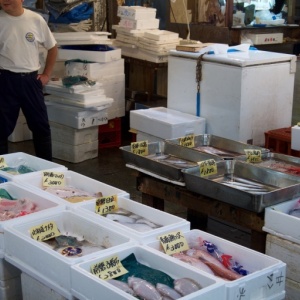
This paper finds that increasing global demand for fish (due to increasing incomes and worldwide population growth) and developments in fishing methods together threaten to further increase pressure on the most popular fish types. It considers improvements in two areas that may decrease this pressure; increasing the production of farmed fish (aquaculture) and improving the effectiveness of fisheries management.
The authors assess how various scenarios of change would affect future wild stock status and simulate the stock development until the year 2048. Through different scenarios they outline ways that the fishery and aquaculture sectors might develop in the coming decades for four popular types of edible fish that are the most important for the world market; sea bass, salmon, cod and tuna.
They conclude that “(i)ncreasing aquaculture production can dampen the fishing pressure on wild stocks, but this effect is likely to be overwhelmed by increasing demand and technological progress, both increasing fishing pressure.” They also point out that farmed fish are often fed with fish from wild capture, and the authors argue that even if more vegetable protein was introduced as feed, pressures on wild fish stocks will inevitably increase in the future. They therefore argue that improving the effectiveness of fishery management to restrict the total allowable catch is of critical importance.
Abstract
Four marine fish species are among the most important on the world market: cod, salmon, tuna, and sea bass. While the supply of North American and European markets for two of these species – Atlantic salmon and European sea bass – mainly comes from fish farming, Atlantic cod and tunas are mainly caught from wild stocks. We address the question what will be the status of these wild stocks in the midterm future, in the year 2048, to be specific. Whereas the effects of climate change and ecological driving forces on fish stocks have already gained much attention, our prime interest is in studying the effects of changing economic drivers, as well as the impact of variable management effectiveness. Using a process-based ecological–economic multispecies optimization model, we assess the future stock status under different scenarios of change. We simulate (i) technological progress in fishing, (ii) increasing demand for fish, and (iii) increasing supply of farmed fish, as well as the interplay of these driving forces under different scenarios of (limited) fishery management effectiveness. We find that economic change has a substantial effect on fish populations. Increasing aquaculture production can dampen the fishing pressure on wild stocks, but this effect is likely to be overwhelmed by increasing demand and technological progress, both increasing fishing pressure. The only solution to avoid collapse of the majority of stocks is institutional change to improve management effectiveness significantly above the current state. We conclude that full recognition of economic drivers of change will be needed to successfully develop an integrated ecosystem management and to sustain the wild fish stocks until 2048 and beyond.
Citation
Quaas, M. F., Reusch, T. B. H., Schmidt, J. O., Tahvonen, O., Voss, R.. It is the economy, stupid! Projecting the fate of fish populations using ecological-economic modeling (2015). Global Change Biology, DOI: 10.1111/gcb.13060
Read the full paper here (requires journal subscription) and see further coverage here.
You can find more resources related to fisheries, fish stocks/overfishing, aquaculture, aquatic systems, consumption and production trends and lastly governance and policy.







Post a new comment »